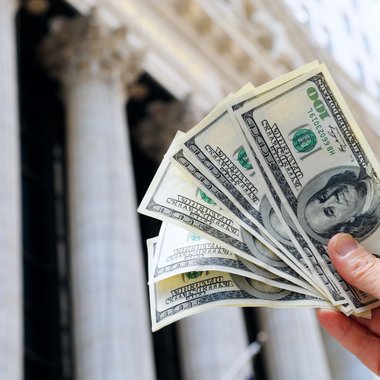How can financial services providers become more inclusive?
Jul 28, 2022For both fintechs and incumbents, a stand-out customer experience is increasingly synonymous with digitalization. But a truly inclusive financial system should be accessible to everyone, including those who predominantly rely on cash.

Financial services firms are investing ever more time, effort, and money into building user-friendly apps with convenient and eye-catching digital features. While most of us might welcome greater digitalization, vulnerable consumers who rely mainly on cash risk being pushed further to the sidelines.
So how can financial services firms close the digital gap, make their products more inclusive, and enable more people to participate in the mainstream economy?
Cash is alive and well in 2022
People tend to associate cash payments with rural areas and the so-called developing world. In reality cash is important to significant numbers of people everywhere, including in highly developed countries.
Almost a quarter of all payments in the U.S. are made in cash. And, while the numbers vary from one country to another, cash plays a critical role in many parts of Europe too.
In Spain, for instance, 83% of point-of-sale and peer-to-peer transactions are paid in cash. And in Sweden, where only 3% of the population withdrew cash from an ATM in 2020, those withdrawals still amounted to a considerable SEK 84 billion (around USD 7.88 billion).
People who pay in cash aren't necessarily facing financial difficulties. For some, it's a choice dictated by convenience, inertia — cash is how they've always paid, so why change now? — or privacy considerations.
That said, there's a strong correlation between paying in cash and being underprivileged.
Women, migrants, and people from other vulnerable groups are more likely to be unbanked or underbanked and on a low income. And, because they pay in cash out of necessity, rather than choice, they risk being disproportionately affected by the digitalization of financial services.
What causes financial exclusion?
People tend to get locked out of the financial system due to a confluence of factors.
According to the World Bank, the single biggest reason people are unbanked is that they don't have enough money to meet the minimum required to access banking services.
Other common reasons include living too far away from a branch, not having ID or other necessary documentation to open an account, and lack of trust in the financial system.
But people can find themselves relying on cash even if they have access to banking services.
In the U.S., 78% of the underbanked — people who have a checking or savings account but rely on alternative financial services like cash and checks — work low-income jobs, many of which are paid at least partly in cash.
The same goes in the EU, where the countries where cash payments are most prevalent have higher percentages of people who are paid at least partly in cash.
Depositing that cash into a bank account can entail a long trip to the nearest branch and time off work with no pay, only for that money to get eaten up by steep monthly account fees and other charges. So it's often easier and more cost-effective to hold on to it and use it to pay when the need arises.
More to the point, for those who live paycheck to paycheck — in the U.S., that's 64% of households — cash is often a last-minute means of payment.
Put simply, with every cent in their checking accounts spoken for and their credit cards maxed out, cash is the only way those struggling to make ends meet can pay their rent, settle their bills, and make loan repayments.
Access, knowledge, means: the three pillars of a more inclusive financial system
Despite it being a critical lifeline, rapid digitalization — particularly in the wake of the COVID-19 pandemic — is making it harder for underprivileged, underbanked, low-income consumers to pay in cash.
So what can financial services firms do to cater to these underserved communities and make the system more inclusive?
First, easier access to financial services is key. And fintechs are ideally placed to lower the barriers to entry, because of their customer-centric approach.
In Brazil, for instance, which has some of the most unaffordable banking services in the world, challenger bank Nubank has enabled 35 million customers to access financial services by offering free accounts and low-interest credit cards.
Similarly, as a result of M-PESA — a joint venture between Vodafone and Kenya's leading mobile network operator Safaricom — 83% of Kenyans have access to at least basic financial services, up from just 24.3% in 2006.
The brilliance of M-PESA, in particular, is that it stores financial data on SIM cards, so consumers can use it even if they don't have access to the internet or a smartphone.
That brings us to the second point: for people to adopt and, more importantly, keep using financial services products, those products must be relevant and reflect their practical needs.
Governments need to improve infrastructure, for example by broadening internet access to cover rural areas, so it's easier to access digital services. But fintechs can also help by enabling customers to easily deposit money and pay online in cash.
Paysafe’s eCash solutions have over one million points of sale in more than 50 countries where customers can walk in and convert their cash to digital money or pay for an online purchase, a bill, or even a loan.
Our network includes convenience stores and other locations consumers visit on a regular basis, which means they don't have to go out of their way.
Digital financial services should work for everyone
There's a strong moral argument in favor of ensuring the unbanked and underbanked, those on low incomes, and other marginalized groups aren't left behind as the financial system continues to digitalize. The true measure of who we are as a society is, after all, in how we treat the most vulnerable.
Financial inclusion also has compelling economic benefits.
Making it easier for more people to access digital services and pay with cash online is an opportunity for financial services firms to broaden their addressable market. Case in point, meeting the needs of women — who are more likely to be financially excluded — could boost financial services firms' revenue by $700 billion.
But enabling consumers to pay online in cash also means greater transparency, more tax revenue, and less debt.
And that's beneficial not just for governments, for the financial services industry, and for businesses, but also for society as a whole.
Interested in integrating eCash into your products and making your offering more appealing to a broader range of customers?



